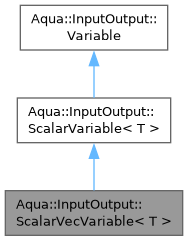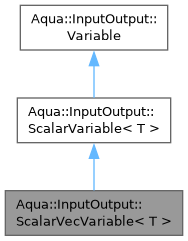Aqua::InputOutput::ScalarVecVariable< T > Class Template Reference
A generic Scalar variable, of 2 or more components. More...
#include <Variable.hpp>
Inheritance diagram for Aqua::InputOutput::ScalarVecVariable< T >:

Collaboration diagram for Aqua::InputOutput::ScalarVecVariable< T >:

Public Member Functions | |
| ScalarVecVariable (const std::string varname, const std::string vartype, const unsigned int dims, int np_type) | |
| Constructor. | |
| ~ScalarVecVariable () | |
| Destructor. | |
| PyObject * | getPythonObject (int i0=0, int n=0) |
| bool | setFromPythonObject (PyObject *obj, int i0=0, int n=0) |
| virtual const std::string | asString (bool synced=true) |
| Get the variable text representation. | |
| Public Member Functions inherited from Aqua::InputOutput::ScalarVariable< T > | |
| ScalarVariable (const std::string varname, const std::string vartype) | |
| Constructor. | |
| ~ScalarVariable () | |
| Destructor. | |
| bool | isArray () |
| Report that the varaible is not an array. | |
| size_t | typesize () const |
| Get the variable type size. | |
| void * | get (bool synced=true) |
| Get variable pointer basis pointer. | |
| void | get (T &value, bool synced=true) |
| Get variable value. | |
| void | set (void *ptr, bool synced=true) |
| Set variable from memory. | |
| void | set (T &value, bool synced=true) |
| Set variable value. | |
| T | value (bool synced=true) |
| Get the variable value. | |
| void | value (T &value, bool synced=true) |
| Set the variable value. | |
| Public Member Functions inherited from Aqua::InputOutput::Variable | |
| Variable (const std::string varname, const std::string vartype) | |
| Constructor. | |
| virtual | ~Variable () |
| Destructor. | |
| bool | isScalar () |
| Let efficiently know whether the variable is a scalar or not. | |
| std::string | name () const |
| Name of the variable. | |
| virtual std::string | type () const |
| Type of the variable. | |
| virtual size_t | size () const |
| Get the variable type size. | |
| virtual void * | get (bool UNUSED_PARAM synced=true) |
| Get variable pointer basis pointer. | |
| void * | get_async () |
| Get variable pointer basis pointer. | |
| void | set_async (void *ptr) |
| Set variable from memory. | |
| virtual PyObject * | getPythonObject (int UNUSED_PARAM i0=0, int UNUSED_PARAM n=0) |
| Get a Python interpretation of the variable. | |
| virtual bool | setFromPythonObject (PyObject UNUSED_PARAM *obj, int UNUSED_PARAM i0=0, int UNUSED_PARAM n=0) |
| Set the variable from a Python object. | |
| virtual const std::string | asString (bool UNUSED_PARAM synced=true) |
| Get the variable text representation. | |
| void | setEvent (cl_event event) |
| Set the variable current writing event. | |
| void | setWritingEvent (cl_event event) |
| Alias of InputOutput::Variable::setEvent() | |
| cl_event | getEvent () const |
| Returns the last writing event associated to this variable. | |
| cl_event | getWritingEvent () const |
| Alias of InputOutput::Variable::getEvent() | |
| void | addReadingEvent (cl_event event) |
| Add a new reading event to the variable. | |
| std::vector< cl_event > | getReadingEvents () const |
| Get the list of reading events. | |
| void | sync (bool readonly=false) |
| Wait for variable reading and writing events to be completed. | |
Protected Member Functions | |
| bool | checkPyhonObjectDims (PyObject *obj) |
| Check that a Python object is compatible with the variable type. | |
| Protected Member Functions inherited from Aqua::InputOutput::Variable | |
| void | cleanReadingEvents () |
| Clean up the list of reading events. | |
Additional Inherited Members | |
| Static Protected Member Functions inherited from Aqua::InputOutput::Variable | |
| static cl_event | createDummyEvent () |
| Create a competed user event to be set as the writing event when synced writing operations are carried out. | |
| Protected Attributes inherited from Aqua::InputOutput::ScalarVariable< T > | |
| T | _value |
| Variable value. | |
Detailed Description
template<class T>
class Aqua::InputOutput::ScalarVecVariable< T >
class Aqua::InputOutput::ScalarVecVariable< T >
A generic Scalar variable, of 2 or more components.
Constructor & Destructor Documentation
◆ ScalarVecVariable()
template<class T>
| Aqua::InputOutput::ScalarVecVariable< T >::ScalarVecVariable | ( | const std::string | varname, |
| const std::string | vartype, | ||
| const unsigned int | dims, | ||
| int | np_type ) |
Constructor.
- Parameters
-
varname Name of the variable. vartype Type of the variable. dims Number of components of the type. np_type Type of the numpy associated object.
Here is the call graph for this function:

◆ ~ScalarVecVariable()
template<class T>
|
inline |
Destructor.
Member Function Documentation
◆ asString()
template<class T>
|
virtual |
Get the variable text representation.
- Parameters
-
synced true if the function shall block until the last writing event is dispatched, false otherwise
- Returns
- The variable represented as a string, NULL in case of errors.
Implements Aqua::InputOutput::ScalarVariable< T >.
Here is the call graph for this function:

◆ checkPyhonObjectDims()
template<class T>
|
protected |
Check that a Python object is compatible with the variable type.
This method is checking that the Python object is an array with the same number of components of the variable type. The internal data type is not checked.
- Parameters
-
obj Python object object.
- Returns
- false if the Python object matchs with the variable type, true otherwise.
Here is the call graph for this function:

◆ getPythonObject()
template<class T>
|
virtual |
Get a PyArrayObject interpretation of the variable
- Parameters
-
i0 ignored parameter. n ignored parameter
- Returns
- PyArrayObject Python object (PyArray_FLOAT subtype).
Implements Aqua::InputOutput::ScalarVariable< T >.
Here is the call graph for this function:

◆ setFromPythonObject()
template<class T>
|
virtual |
Set the variable from a Python object
- Parameters
-
obj PyArrayObject object (PyArray_FLOAT subtype). i0 ignored parameter. n ignored parameter
- Returns
- false if all gone right, true otherwise.
Implements Aqua::InputOutput::ScalarVariable< T >.
Here is the call graph for this function:

The documentation for this class was generated from the following files:
- /home/pepe/SPH/Code/aquagpusph/aquagpusph/Variable.hpp
- /home/pepe/SPH/Code/aquagpusph/aquagpusph/Variable.cpp
Generated by